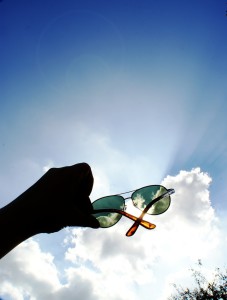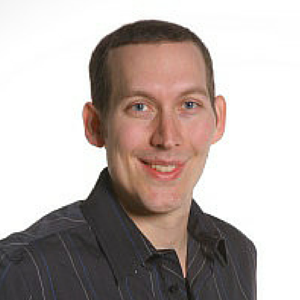I recently listened to an Invisibilia podcast called “Becoming the Batman,” in which the hosts discuss the concept that blindness is a social construction. They talk to the author of the book The Making of Blind Men, Robert Scott, who explains it simply: “The disability of blindness is a learned social role.”
He goes on to explain that the stereotypes and assumptions others make about blindness, from other people to the blindness organizations that serve them, create the criteria and beliefs in the minds of blind people about how blind people are supposed to be. Or, to put it another way, “How they function is a process of learning, not imposed by their condition,” Scott says in the podcast. Then the hosts use the example of Daniel Kish, a blind man who learned how to ride a bicycle though echolocation, to prove their point. While so often people who are socialized into blindness say, “Blind people can’t do those things,” there are blind people like Kitsch who prove them wrong.
 Scott explains that the socialization comes about from a blind person’s developing self-concept, his attitudes, thoughts, and feelings about the kind of person he is. This continues throughout the blind person’s life, Scott says, until they internalize the beliefs and stereotypes others have of them. “When they have been rehabilitated, they are all blind men. They have learned the attitudes and behavior patterns that professional blindness workers believe blind people should have.” In this way, “blindness becomes the primary factor around which they organize their lives and in terms of which they relate to other people.”
Scott explains that the socialization comes about from a blind person’s developing self-concept, his attitudes, thoughts, and feelings about the kind of person he is. This continues throughout the blind person’s life, Scott says, until they internalize the beliefs and stereotypes others have of them. “When they have been rehabilitated, they are all blind men. They have learned the attitudes and behavior patterns that professional blindness workers believe blind people should have.” In this way, “blindness becomes the primary factor around which they organize their lives and in terms of which they relate to other people.”
This podcast got me thinking about the effects of socialization in our society, and specifically, how many times we are socialized, sometimes without even realizing it, in order to conform to our society. So after experimenting with a series of different aspects of our culture, the one that really had a visceral impact for me was violence. To see how this works, take a look at some of those quotes and replace blindness with violence. For example: “The disability of violence is a learned social role.” And another: “When they have been rehabilitated, they are all violent men. They have learned the attitudes and behavior patterns that professional workers believe violent people should have.” And the final quote, “Violence becomes the primary factor around which they organize their lives and in terms of how they relate to other people.”
How true are these statements? How many of us have lives and relationships that are centered around violence? Speaking for myself, every year I have a tremendous opportunity to build relationships with 120 or so teenagers, and the amount of coercion and shame or compassion and empathy in those relationships is entirely dependent on what I bring to the classroom. And that’s just me. When I think back on my childhood, I think of how much I have been socialized to be violent towards others, to look out for number one, that violence is the only way to solve problems. I think about all the movies, news stories, advertisements, history, and personal experiences that prove violence is “true,” that to get is better than to give, that scream at me that I need to be different somehow than I am. We get this message every hour of every day from all directions. And my point is that it is learned social behavior, passed to us from our culture, not a part of our human nature.
Now, if violence is learned behavior, it’s time to recognize that we have a chance to turn the tide. We have an opportunity to be nonviolent agents of socialization, un-learning the violence and resocializing into nonviolence. Think about how many people pass through your circle of influence every day. What if we meet them with with love instead of separation, with kindness instead of suspicion? What if we treat them like a long lost family member instead of a suspicious character? If we start with one change, one person we meet with love, I believe we can, like Daniel Kish, prove the socialization stereotypes wrong. And then, people will say, “End war? Feed the hungry? Save the Earth? Oh, yeah, nonviolent people can do those things.”








